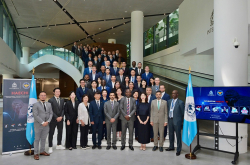Social engineering fraud is a broad term that refers to the scams used by criminals to exploit a person’s trust in order to obtain money directly or obtain confidential information to enable a subsequent crime. Social media is the preferred channel but it is not unusual for contact to be made by telephone or in person.
Forewarned is forearmed
Understanding the mechanism behind these different types of fraud is crucial to warn unsuspecting members of public so they are not taken unawares.
Some scams target a wide audience in order to trap as many victims as possible whereas others address specific individuals.
Phishing, Vishing and SMShing
Fake emails/text messages/telephone calls purporting to be from a legitimate source such as a bank or e-commerce site are used to induce individuals to reveal personal or financial information.
Telecom fraud
Random victims are contacted by a criminal claiming to be a friend, relative or someone in a position of authority and tricked into parting withsending money.
Business Email Compromise
Criminals hack into email systems to gain information about corporate payment systems, then deceive company employees into transferring money into their bank account.

Romance scams
Criminals develop a “relationship” with victims through social media with the ultimate goal of obtaining money.
Investment/Boiler room fraud
Victims are pressured into investing in fraudulent or worthless shares.
Sextortion
Victims (both men and women) are coerced or tricked into sharing explicit images or videos which are subsequently used for blackmail.
INTERPOL makes a point of staying abreast of these ever-changing trends and we regularly host expert meetings on social engineering fraud.

Operation First Light
We conduct global anti-social engineering fraud operations codenamed “First Light” with the support of local police forces. In telecom fraud, the calls tend to come from offshore call centres and the proceeds are usually transferred overseas.
The most recent Operation First Light took place from July to September 2017. Police raided 33 call centres based in Asia and arrested 1,013 people, suspected mostly of coordinating or placing cCold calls are placed to victims in other countries worldwide to deceive them into paying money. Typical modus operandi involved them callers pretending to be relatives in trouble and needing money, or posing as public officials requesting payments for services. Assets worth 3,47 million USD were seized.









